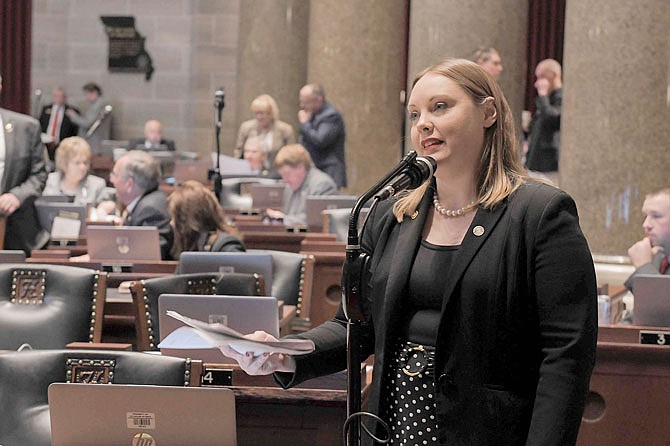A Mid-Missouri lawmaker and child care advocates are at odds over language included in a bill intended to ease restrictions on certain child care facilities in the state.
State Rep. Sara Walsh, R-Ashland, has offered House Bill 32, which would allow that children who are related to the operator of a licensed in-home or group-home child care facility are not to be counted when calculating the maximum number of children allowed under the license.
The bill would repeal part of Nathan's Law, which passed in 2019.
House Bill 397, which was intended to more strictly regulate child care facilities, came about in 2019 after number of incidents in unlicensed Missouri facilities. The law was named after 3-month-old Nathan Blecha, who died from suffocation at an unregulated in-home child care facility in Jefferson County in 2007.
The 2019 bill limited in-home child care facilities to six or fewer clients. It increased the offense for illegal care from an infraction to a misdemeanor and allowed the Missouri Department of Health and Senior Services to assess fines related to illegal care (or to file suit in circuit court to prevent imminent bodily harm).
Soon after Nathan's Law passed, child care providers realized it handcuffed them.
For more than a year and a half, Walsh and child care advocates - including Kids Win Missouri and Child Care Aware of Missouri - have worked on details of HB 32.
However, when HB 32 went in front of the House Children and Families Committee on Jan. 27, Craig Stevenson, director of policy and advocacy for KWM, testified against it.
"Our concern is with the underlying bill - not the substitute that she's presenting," Stevenson said. "The underlying bill would allow for an unlimited number of children in a home setting."
The goal of Nathan's Law was to limit the number of children in unlicensed facilities. However, it ended up limiting the number in licensed facilities, too.
Related children of licensed providers now count against the providers' limit of how many children they may serve.
The youngest children need to count against that limit, regardless of whether they are related to the provider, Stevenson said.
"The littlest kids require intensive care," he said. "The vast majority of home care providers that we deal with really do agree that there is an age - no matter whether they are related to you or not - they really need to count."
Walsh posted a letter on her Facebook page Friday questioning whether organizations like KWM and CCAM are willing to help resolve questions Nathan's Law created.
"If you have additional actual compromise language (not just thoughts, research or telling providers on Zoom calls - that I am not invited to - that you need to hold more meetings with me) to amend my House committee substitute, bring it," she wrote.
She said she is resolved to find solutions that ease constituents' burdens.
Walsh told the News Tribune on Tuesday the committee was expected to hold executive session on the bill today, but all hearings have been canceled because of weather. Instead, it should be heard next week.
"That gives us a little bit more time," Walsh said.
She said she met with Committee Chairwoman Rep. Mary Elizabeth Coleman, R-Arnold, Tuesday morning to hammer out different wording.
"The language that I'm in the process of working with the committee chair on will say that children that are 5 or older that are related to the provider within the second degree of connectivity, including grandchildren, nieces, nephews, etc. (will have exemptions)," Walsh said.
The Zoom meeting Walsh spoke about in the letter wasn't intended to bash her bill, Stevenson said. It was intended to help organizations get to know child care providers and to hear their concerns, he said.
Child Care Aware of Missouri CEO Robin Phillips agreed.
"It was about the CEO of Child Care Aware of Missouri trying to build relationships," Phillips told the News Tribune.
Phillips also testified against the bill in January because it didn't limit the number of children in child care facilities.
"To go up to the third degree and have no cap - that was just not OK," she said.
The frustrating thing for child care facilities across the state is that Nathan's Law was intended only to address the number of children who may be in an unlicensed child care facility, Phillips said.
It had unforeseen consequences, she said. Numerous child care providers closed their doors.
The new law created challenges for employers, according to Carolyn Chrisman, an economic developer in Kirksville. So much so, her community and others in Northeast Missouri created a task force encompassing 16 counties that is focused on child care and housing.
The task force conducted a survey and found child care became an issue for workers in factories, hospitals and universities.
"It was a community-wide issue," she said.
Professionals moving in from outside the area had to be aware they wouldn't have family support if they didn't find child care.
Providers need to connect with each other so they can share their concerns about legislation when it comes up, Chrisman said.
The Northeast Missouri task force is trying to create a statewide email contact list so it can inform child care providers about changes or proposed changes to laws, she said.
Whether they are licensed or unlicensed, exempt, in-home or outside the home, big or small, they should get involved in "calls to actions," she said.
To join an email list, providers are encouraged to contact Chrisman at [email protected].

